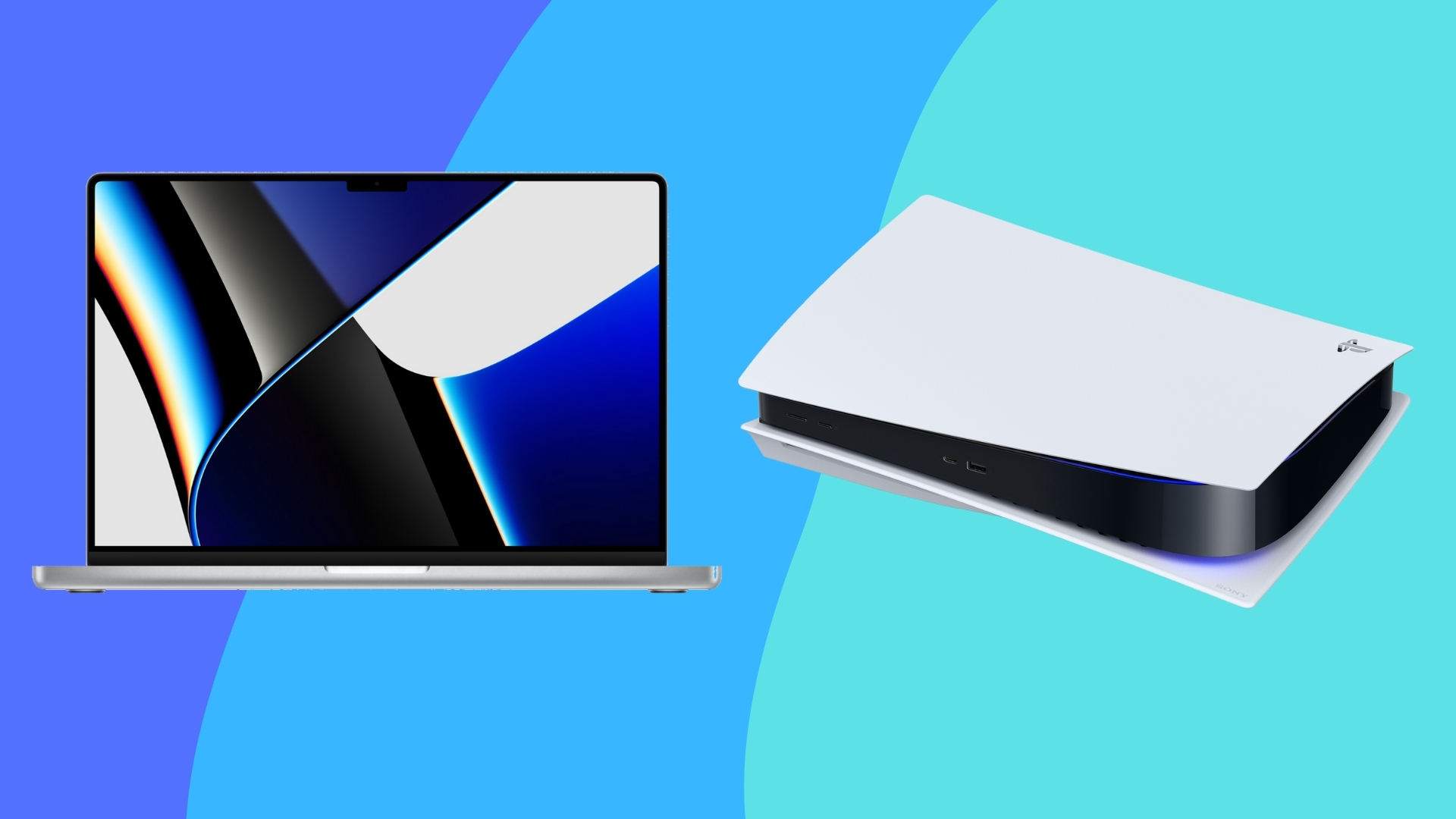No, the M1 Max MacBook Pro isn't 'better' than the PS5
$500 console vs $4000 laptop

It's barely been 24 hours since the new generation of Apple Silicon was revealed, with the M1 Pro and M1 Max chips featuring inside the new MacBook Pro laptops at the Apple Unleashed event on October 18.
Despite it still being wet behind the ears, a few comparisons have already been made between the M1 Max's graphics potential and that of the Sony PlayStation 5.
Given that one product is a gaming console and the other is a powerful workstation laptop, it's pretty unfair to make this comparison at all, but let's unpack what's actually going on.
- Best MacBook and Macs: top Apple desktops and laptops
- macOS 11 Big Sur problems: how to fix the most common issues
- These are the best processors
Let's not get ahead of ourselves
By the way: The PS5 has 10.28 Teraflops of performance. The M1 Max has 10.40 Teraflops. Mind blown! 🤯October 18, 2021
As reported by WCCFTech, YouTuber Vadim Yuryev provided some performance stats of the M1 Max, claiming that it can deliver 10.40 Teraflops of performance against the 10.28 achieved by the PS5. On paper, this would paint the console as graphically inferior to a MacBook Pro 14-inch powered by the flagship M1 Max SoC (system-on-a-chip), but theories will only get you so far.
In reality, the M1 Max being faster than the PS5 in Teraflops performance doesn't automatically make it a better piece of hardware. There are other performance categories to consider, such as the M1 Max's bandwidth of 400GB/s stacking against the PS5's speedier 448GB/s.
There are of course comparisons that Apple has made directly to PC gaming laptops though, which are certainly promising for anyone who was hoping to play games on their shiny new MacBook Pro (though that would be a very poor investment, given the price you're paying for one equipped with an M1 Max).
Apple does claim that the M1 Max chip offers "similar performance" to a "pro laptop with high-performing discrete GPU" while using 100 watts less power, having tested the fully specced out 16-inch MacBook Pro against the MSI GE76 Raider and the Razer Blade 15 Advanced.
Sign up for breaking news, reviews, opinion, top tech deals, and more.
MacBook Pro (M1 Max) vs PS5 🤯:Bandwidth:M1 Max - 400GB/sPS5 - 448GB/sRaw GPU Performance:M1 Max - 10.4 tflopsPS5 - 10.3 tflopsSSD Speeds:M1 Max - 7.4GB/sPS5 - 5.5GB/sOctober 19, 2021
Another tech YouTuber, Zone of Tech, also pointed out some performance comparisons between the two devices.
The main issue we have in trying to stack the two together, is that they're not comparable pieces of tech. It's like trying to compare the differences between a Dyson Hairdryer and a Shark Vacuum – they might share similar components but the two are made for entirely different purposes. You would play Horizon: Zero Dawn on a MacBook Pro about as much as you would do some 8K video editing on your PS5.
If these estimations are correct then yes, the new M1 Max might be more graphically capable than a year old Sony console. But without the library of AAA games, gaming optimization and dev support, the two don't share the same market, especially with the price difference.
The world is ready for AAA macOS gaming
Let's focus on some good stuff that has come out of these investigations. While ARM architecture and cooling may be a concern, the M1 Max certainly looks like it could be viable for playing AAA games – but it's going to need help.
The library of games available to play on macOS natively is small, with many developers opting not to optimize their games for Apple devices. If we want to see the latest titles from Rockstar or Bethesda on upcoming Mac devices then both Apple and the wider game development community will need to work together to make it happen.
With Apple expanding into other industries in recent years, such as automotive, smart home, and processors, creating its own system optimized for the latest demanding games is a logical step for the tech giant, especially given its dedicated userbase.
Apple has proved that if it throws a lot of money and development at something, it can create something that blows our minds. Until that same focus results in a Mac gaming laptop or Apple console (which we would 100% be down for), let's leave these comparisons at the door.
- These are the best laptops of 2021
Jess is a former TechRadar Computing writer, where she covered all aspects of Mac and PC hardware, including PC gaming and peripherals. She has been interviewed as an industry expert for the BBC, and while her educational background was in prosthetics and model-making, her true love is in tech and she has built numerous desktop computers over the last 10 years for gaming and content creation. Jess is now a journalist at The Verge.
